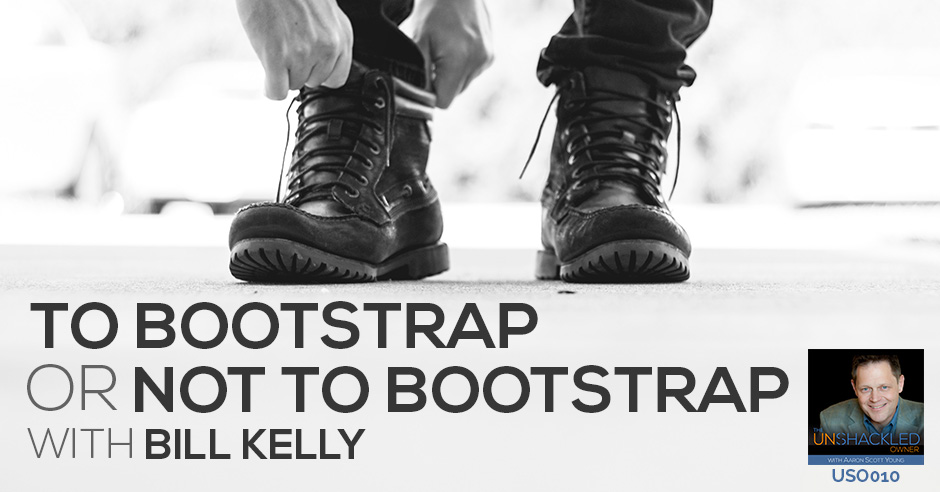
Welcome to the Unshackled Owner Podcast. One of the things that I’ve been looking forward to is beginning to introduce you to some of the people that can shed light in a very specific way so that you can get the knowledge you need to make smart choices as you’re building your business. Today’s guest is Bill Kelly of WJKelly Solutions. We’re going to talk about resources and how to handle those resources successfully, and whether your best option is to bootstrap or not.
 Bill Kelly is a successful entrepreneur, board member, investor, and advisor based in Portland, OR.
Bill Kelly is a successful entrepreneur, board member, investor, and advisor based in Portland, OR.
Bill was on the founding teams of Sapient Health Network (now WebMD) and Learning.com. In both companies he raised substantial outside capital and generated positive returns for early investors.
He has since been involved in starting ReelDx (which provides libraries of real patient video case studies for medical education) and AgriCascadia (an investment bank serving the new agricultural economy).
He sits on the boards of BLIS, Inc. and Great Minds LLC. He is also active in a number of industry and non-profit projects.
Bill is married with four adult children. He and his wife currently live in Lincoln City, OR. He received degrees from Brigham Young University and Harvard Business School.
Listen To The Episode Here
To Bootstrap Or Not To Bootstrap – Interview With Bill Kelly
Hello everybody. This is Aaron Young and welcome to The Unshackled Owner, episode 10. This is the program where we show you how you can build a business that works harder for you than you have to work for it. Up until now, I’ve done monologues. I’ve come on and talked to you about things that I thought were important for you to hear about to get into the mindset, to get you into the groove of being an unshackled owner. One of the things that I’ve been looking forward to is beginning to introduce you to some of the people that I get to work with and some of my friends and some of the people that I believe can shed light in a very specific way so that you can get the knowledge you need to make smart choices as you’re building your business.
All businesses need resources. I see so many companies that fall flat on their backside because usually, one of two things, really, three things kill businesses. One is a stupid idea. If you have a horrible idea, that will kill your business. Most people have kind of good ideas. Then, there’s two things. They don’t have a good plan. They don’t have a good matrix. That’s what we’re teaching people in the unshackled owner program. And, maybe the biggest single killer of a business’ opportunity to survive is they don’t have enough money. They don’t have enough financial resources.
I thought, let’s have the very first interview be with somebody who can really talk from a position of strength and experience about having money to do projects. What I want to do is I’m going to tell you a little bit about today’s guest. His name is Bill Kelly of WJKelly Solutions. I say that because that’s his inner hub. When he’s going to evaluate projects, it all starts at WJKelly Solutions. I’ll tell you a little bit more about who this guy is.
When I was a freshman in high school, I already knew Bill. We’d met each other in 7th or 8th grade but we started becoming really good friends, going to school together in the back of a pickup truck. We went to a magnate school in our city, I think called Benson high school. Bill and I became good friends. We had a lot of complementary skills. For one thing, he’s a great piano player, I was singing. We did a lot of musical stuff together. There was a radio station at our high school and Bill was the great fabulous guy behind the glass and I was student guy on the microphone. We produced programs, including running an award winning program, NPR award winning program, called Portland High Life.
We graduated from high school. Bill had good grades, I had bad grades. Bill got to go to university. I had to go to junior college. He was a great student and I was always bad at school so I dropped out after one year of college. He went on, graduated. He went on, had some interesting work with Knight Ridder Publishing in Charlotte, North Carolina. Then went to Harvard Business School and then came back out of Harvard Business School in the 90s right as the internet was taking off.
Bill started a company called Sapient Health Network that ended up, through some aggregation of companies, he ended up on the founding leadership management team of WebMD. He’s one of the founders of WebMD. He started another company after that called Learning.com. Five million kids a day log on to Learning.com so they can gain all kinds of different curriculum over computers in their classrooms. He’s helped launch a number of companies. I want to bring him on right now. Bill, are you there?
I am.
Here’s Bill Kelly. Say hi.
Hello everyone.
It’s great to have Bill here. Is there anything you want to add to that introduction Bill, that maybe I left out?
Should I say that I introduced you to your wife? That is one of the better things that I’ve done in my life. One of the things I’m most proud of.
You also were the one who officiated over the marriage of my daughter and her husband.
I’m feeling very proud of that, yes.
You guys, this is a complete set up because Bill is right now down in our beach house that we own together. They’re in transition. They just sold the home they’ve lived in for a couple of decades. They’re going to be building a new house so he and his family are staying at the … I guess you and your wife and maybe one of the kids, staying at the beach house. Anyway, Bill is my best friend, everybody. The interesting thing is that over time, we’ve both built all these companies and we’ve done it very differently. Let’s just have a conversation here and bring people in on this. You went to Harvard Business School and you came out and your very first business, Sapient, you decided to do a very traditional route and you started to raise money. Is that right?

To Bootstrap Or Not: Go get a job in the industry that you care to work in and learn it from the inside.
That’s right. I can start the story a little bit before that. In my second year at Harvard Business School, I had a great professor of entrepreneurial finance. You can image all these hotshot Harvard Business School students sitting around thinking they’re going to take over the world. He made it clear to us that the right way to succeed in starting a business is to know the industry. His advice was, “Go get a job in the industry that you care to work in and learn it from the inside and your ideas will come to you from understanding how that industry works.” It was one of the best pieces of advice I ever got. Really, my first job out of Harvard Business School was with a small CR ROM publishing company in Portland, Oregon called Creative Multimedia.
For those who are too young, can you tell them what a CD ROM is? Because it was the transition technology.
In 1993, when I came out of Harvard Business School, CD ROMs were the new new thing. They were the way that modern publishing was going to happen, this is a couple of years before the internet actually became a consumer platform that we thought of using. CR ROMs, everybody knows what a CD is. A CD ROM is a data device that holds all the information in one location. The problem with it is that you have a physical thing that you have to push through whatever channels you’re using and that you had to hold inventory on. It’s a terrible way to do business, and I learned that in the first six months being there. It was really out of the experience at Creative Multimedia that I met the people and saw the insight that led to Sapient Health Network. My professor’s advice actually literally came true for me. I jumped into a place where I wanted to be or where it looked I was headed to where I wanted to be. Met great people, saw great opportunities and was lucky enough to be doing all that right when Netscape went public in 1995, which kicked off the whole consumer internet thing. That led directly to Sapient Health Network which led into WebMD. That was really quite an astonishing ride.
To get the thing going, you guys went out and first started to Angle investors, right?
Right, exactly. We wrote a business plan, we had projections in the business plan, and we went straight to Angel investors. We did not start working on the business until we had commitments from those Angel investors to fund the early stages of this thing. When you say it’s a traditional route to starting a business, there’s a formula here that we used which relies entirely on outside capital to get up and running. Your aim right from the beginning is to build something big and return a lot of money to your investors.
People come to me all the Bill, and they’ll say, “I’ve got this thing that I’m starting and I’d like you to be an investor.” I’m like, “What are the terms of that investment?” They’re saying, “What do you mean?” I say, “I’m going to put money in. What am I going to get back in return?” I’m always surprised at how many people who are looking for “investors” but they’re not really thinking about what … They’re saying, “I think you have a lot of money and I don’t have a lot of money. I’m wondering if you’ll put money into my widget manufacturing or my cupcake shop or my plumbing business or whatever and help me get this thing up off the ground.”
I see this constantly, constantly. I go these events and people are always saying, “We need to raise a quarter million dollars.” Here’s the funny one. “We’re going to raise a million dollars.” If I say, what are you going to do with a million dollars?” They’re like, “I don’t know. I’m going to finally start paying myself I guess.” They’re not really thinking about what’s in it for the investor. Without getting too complicated, what should people think, if they decide that bootstrapping is not going to facilitate their dreams, they can’t go fast enough by bootstrapping … Bill, you know this, I’ve bootstrapped everything that I’ve done. I’ve never gone out and taken an outside investor capital.
I’ve never not taken outside capital.
Here you have best friends for 35 years, I don’t know, we’ve been best friends since 1978.
I’m only 38 so I don’t know what you’re talking about.
When I would baby sit you. The point is we’ve been best friends since 1978 so that’s coming on 40 years. Is that right? Did I get that math right?
Yeah.
40 years. We’ve both spent the majority of our adult lives running our own businesses but we’ve done it utterly differently. I’ve never been as big as something like WebMD or what Learning.com has grown into. I’ve never done anything that big. But I’ve never had shareholders looking over my shoulder. Explain to the listeners now, what’s the deal? These investors, if they’re going to put money in, what do they want from you? What are they demanding from you?
Let me point one thing first about that story about you and me, which is, as far as I can tell, and I haven’t looked deeply into your finances, but I perceive that despite the different ways we’ve gone about it, both of us have made about the same amount of money off the entrepreneurial activities that we’ve done. Your companies have achieved smaller scale, objectively. But by giving up interest in my companies along the way, my personal return has actually been lower than it might seem if you say, “This guy was the founder of WebMD.” Let me tell you, there are a lot of other people that made a whole lot more money than I did out of the WebMD deal.
The big difference between us, I tend to make more money every month and you have opportunities to have gigantic, huge paydays, multimillion dollar paydays, which I’ve never had.
And you will. Trust me, Aaron, you will.
Thanks so much. Thanks, Dad. What are your investors looking for?

To Bootstrap Or Not: Investors care about protecting their investment and generating a risk adjusted return on their investment.
What do investors care about? It’s pretty simple. Investors care about protecting their investment and generating a risk adjusted return on their investment. Most people who are going to invest in somebody’s idea or somebody’s company, unless it’s friends and family, unless it’s your dad or uncle or brother or sister or whatever, most people do this with some frequency. Most people who would consider doing it do it with some frequency. The first thing you’ve got to know is that you’re competing with everybody else out there who’s going to the same small group of people and saying, “Invest in my deal.”
You have to start putting yourself in the seat of that person you’re going to and imagine what it’s like to see ten of deals a week or whatever it is they see. One of the biggest mistakes that entrepreneurs make is assuming that everyone sees the world the way they do. By the time you’re out there asking for money, you’ve been spending so much time thinking about the idea and figuring out who you’re going to sell it to and how are you going to manufacture the product and how you’re going to merchandise it at retail. Whatever the operating implications of the company are, you’ve been steeped in it for months, maybe years by the time to come to that conversation with that person.
You’re caught up in your own dream and you figure that everybody else already understands all the stuff that you’ve been living with and bathing in every day.
Yeah, because by that time it’s obvious to you why this is a good idea, and it should be obvious to anybody that you spend 15 minutes explaining it to. That’s just not the case. Right away, you’ve got to understand that people who invest in small companies, they try and pattern match. They’re looking for things that seem familiar based on their experience investing in previous companies. They get a pretty good sense of the people, the nature of the product, whether you understand who your customer is, what the pricing needs to be, who your competitors are, all that stuff. If you can start to answer some of those basic questions from a very basic standpoint, then you might be able to get the attention of one of these people who might like to invest in your company. But no matter what, they’re going to be looking not just for the excitement in your eyes but the logic of the business idea and your clear eyed view of what the market looks like and what your competitive environment looks like. Ultimately, how big can this be? How big can it reasonably get and what does that look like in terms of a return to the investor?
I’m going to guess, they don’t necessarily care how you’re going to change the world or how you’re going to save the whales or you’re going to clean the air as much as do you have a good group of people that are at the core of the team and how are you going to use their money. They probably don’t really want you to pay yourself very much of that money. They want you to earn enough money so that you keep in the game, I would guess. Is that true or not true?
Let me go back a step. Most investors actually do care if you’re going to change the world, if you’re going to clean up the oceans and cure cancer. They care about those things because those are big ideas. They care about them for two reasons. One, if you’re really going to do that and you’ve got a way to get your product to market and compete and succeed, that’s big. That’s huge. I don’t take lightly somebody’s claim that they can reduce pollutions in the air or whatever. Those are reasonable things.

To Bootstrap Or Not: It’s a sacred obligation. The investors’ return is more important than my return at that point.
The second thing about them is the investor is looking for passion in the founder. It’s going to be that passion that keeps them in place. This dub tails with the other part of your question. Most investors absolutely do not want to pay you a fair market wage. The reason is they don’t want you to consider this just a job. They want you to consider this almost a sacred obligation. I actually take it that way. When I take somebody’s money for one of the companies I’m working on, I take it as a sacred obligation that their return is more important than my return at that point in time.
If I have to take a lower or no salary for a while, I’ll do it. If I have to make sure we’ve got sales people that are making more money than I am, I’ll do it. Whatever it takes to get the operations of the company up and running and to convince the investor that I’m securely in place. I’m not going to bail on them, I’m not going to get an offer to go work at some other company for more money and take it. I’m committed to the project. They want to see that. Passion plays into that. Paying yourself less than market wage absolutely plays into that. They want to see that you’ve got skin in the game for sure.
Part of that sacred obligation is that if they say yes, they’re giving you the opportunity to, not to make it sound too silly, but to fulfill your dream. They’re saying, “Let me provide the resource for you to go out and chase this thing that you’re trying to prove to me, you’re trying to convince me you can do this. Even though maybe it hasn’t been done before, it hasn’t been done this way. Part of the person receiving or the company receiving the investment … Let me say the person, the founder that’s receiving that investor’s money, they have this sacred obligation and they need to be prepared.
This is the thing people don’t get, folks, let me just give you my opinion. I’m welcoming Bill to give a different one. My belief is that if you’re going to go out and be an entrepreneur and you’re going to try to really build a company, you’re better off if you’ve already got some savings or you’re willing to live very small for a while. Because you don’t want to be pulling resources that could be going into marketing or technology or key employees or whatever, you don’t want to be pulling that money out of that company so that you can drive a fancy car or upscale your house. You only get that, that’s a consequence of the success of the company. Maybe somewhere down the road you get to increase your salary. Bill, how many businesses did you start where you didn’t start off making a big salary?
I’ve never made a big salary. The most I’ve ever been paid is $200,000. That’s after a year and that’s after running Learning.com for eight or nine years.
You hear that, folks?
And we’re making $25 million in revenue at that point in time.
At that point, you said, “I can justify myself. I can pay myself a little less than 1% of the revenue as the leader’s salary and the founder’s salary.”
It wasn’t my decision. This is important.
This is important. I’m glad we’re going here.
It’s not like you get into this thing and take somebody else’s money and they go away and say, “Good luck, let me know if you succeed.” Typically what you get is you get a board of directors, you get investors who want to be informed and updated frequently about what’s going on. With your board of directors, you get formal corporate governance which includes having the board of directors be in charge of senior executive salaries, particularly the CEO. It was not my decision to pay myself a certain amount. I didn’t just decide one day, “I need to make a little bit more money and go tell me bookkeeper, ‘Increase my salary,'” and that was that.” It was a board deliberation and a board decision. That’s just an illustration of the control that you give up when you take outside capital.
When we saw the movie, the Steve Jobs movie that came out I guess earlier in 2016 with Michael Fassbender. We all know the story that Steve Jobs got fired from Apple. Even though he was the founder, even though he and Woz were in the garage figuring it all out, even though he was visionary, or at least he was the face and the salesman, the spokesman. But then the board was able to fire him. What you’re saying is if I have a dream and I have this idea and I go out and get investor money so that I can really take my idea and really explode it out into the world, you’re saying that that board of directors has the right to fire me.
Absolutely.
That doesn’t mean you’re not a shareholder anymore.
That’s right.
The founder is still a shareholder. Folks, I want you to hear this very important thing. Especially when you have outside investors and you have a board that’s actually looking over your shoulder and expecting specific results, you have not just a moral but a legal obligation to be a good steward of this money as the CEO. There’s a reality, there’s difference. Listen to this, it’s so important. There’s difference between being the shareholder, the owner, there’s a difference between being the shareholder and being the director, or the director and being the employee, even if you’re the president of the company, that’s different than being the owner. You could be an owner but still get fired from your job in the business if the board decides you’re not really the right person to have as the person in that job.

To Bootstrap Or Not: As soon as you take that money, your dream is no longer your own. It better be ready to stand on its own.
Aaron, can I go back? I want to go back to one thing you said before. When I used the phrase sacred obligation and you talked about how now you’ve got somebody who’s funding your dream. I understand what you mean by that but I’d like to point out that as soon as you take that money, your dream is no longer your own. It better be ready to stand on its own. You better be ready to do whatever it takes to have that product idea or that company idea succeed up to and including taking yourself out of the equation if it’s necessary. If there’s a better person to run it, if there’s a better way to run it, if the product needs to be changed in order to meet the market demand, all those things now need to happen in a deliberative way with the board of directors and the senior management team that makes those calls. Not just you calling the shots all along the way. In a very real sense, as soon as you take that money, you have to extract the dream from your soul. I’m trying not to be too dramatic about this.
No, this is good.
You’ve got to take it out and allow it to live on its own without you being its loving mom or dad and protecting it from everybody’s criticism. Your dream has to stand on its own and respond to everybody’s criticism. And in fact, change and morph and become the thing that it needs to be at the end of the day. Here’s another thing that I never did running a company. I never fully executed the original business plan of the company.
By the time we took outside capital under a certain business plan and then got market feedback about what was going to work, we realized we need to change something fundamental about what we were doing. The product or the delivery or the sales or marketing approach or whatever. Those are hard conversations to have with outside investors because they start with, “Wait a minute, you told me that X, Y and Z was going to happen. Now you’re telling me that Y and Z is no longer valid and you’re going to have to adopt M, N and Q in order to get things done. Why should I continue trusting you?” Those are hard conversations and I’ve never not had one of those conversations in one of the businesses that I run.
The shareholders are now a part of your life and you have an obligation to talk to them. They may not even be a majority shareholder where they can force your hand, but you still have an obligation to talk to them, I would think both legally and also if you ever want to raise money again. Your reputation is important.
Your reputation is all you’ve got in this. Whether you succeed or fail, you can succeed poorly and you can fail well in ways that either preserve or destroy your reputation. That’s absolutely something you have to pay attention to.
The way you fail, you can fail well and it will ensure or at least it will not tarnish your reputation. Is that always rosy? Can you share an experience, really a bad day or some time when you had somebody’s money, you’re building a business and it just didn’t work out? Then, how did you recover from that?
From a founder standpoint, I’m lucky enough, and I really mean that, that the companies that I’ve been CEO and that I’ve taken outside capital have always returned positive returns to the early investors. Learning.com is still in that mix even after almost 20 years. I have every reason to believe that will return positive returns to the mid-level and late investors. I’ve always been able to return positive returns to my early investors. That’s not because everything goes swimmingly. In fact, the beautiful, rosy, ‘I love what I’m doing’ days are the rarity when you’re running a business like this. Mostly what you’re doing is you’re fighting fires, you’re trying to help people get out of their own, you’re trying to put resources in place that people can use the do what they need to do. All these are heavy lifts and very difficult tasks.
You look at a Steve Jobs, you look at a Mark Zuckerberg or you look at a Bill Gates or any of these glowing stories of massively successful billionaire style entrepreneurs. I almost hate that we put so much emphasis on those stories because they are literally the one in a million or one in ten million kind of stories. For every Bill Gates or mark Zuckerberg or Steve Jobs, there’s a hundred thousand entrepreneurs that succeed and fail every single day. They do it by working hard and they do it by not giving up.
As soon as you take that money from somebody, you cannot treat them like they are the enemy or like you need to mask information for them. What you need to do is develop a very great relationship with them where you can go to them and say, “This isn’t working. This thing that we’re trying to do isn’t working. What’s your advice? I want to make sure you know what we’re trying to do to solve that.” Because if you let bad news fester for too long, it’s going to turn against you in that person’s eyes. If you bring them into it early enough on, then you can get the benefit of their experience and their advice and you’ve communicated something hard to them and you’ve demonstrated to them that you’re still committed and you’re still working on solutions.

To Bootstrap Or Not: Everybody expects there to be problems and turns and shifts along the way. You have to be able to admit and to build a plan and then execute that plan.
Nobody expects any of these companies to go without a hitch and any of these products to be perfect the first time they’re designed or the first time they’re introduced to market. Everybody expects there to be problems and turns and shifts along the way. You have to be able to admit and to build a plan to address and then execute that plan with full transparency with your board, your investors and your management team. If you can master those things and you do them and your company fails along the way despite you seeing things clearly and doing everything you can to counter the bad things that are happening, that’s when you preserve your reputation and that’s when somebody will be inclined to listen to you again when you have your next idea. Does that make sense?
It’s great. In summary, we need money, we have to either have it in our own pocket or we have to go seek it from outside investors. Those investors have got to have a good reason to come in and to put money into your dream, which now has become a real, living, breathing thing. It’s no longer yours. It’s now part of this collective that’s all invested in it. You’ve got to respect these people, even when you feel like they’re getting on your nerves a little bit or they don’t really understand the day to day. You have more than an obligation. They’re part of why you exist. You have to take their calls. Do you think taking money, do you think capital raising is right for everybody?
No.
Most companies don’t. What would be a way for people to say, “I wonder if this is for me or not.” A quick answer on that.
It’s a very simple answer. If I take a million dollars and from somebody outside the company, given the stage and the risk profile of my company, can I reasonably expect to return $10 or $20 million to that person in five to ten years’ time? If the answer to that is yes, and a reasonable yes, an objective yes, then you probably qualify for outside capital. Doesn’t guarantee you’re going to get it but at least you’ve got a story to tell that will make people consider it. If you can’t answer that question with a positive, you really need to think about different ways to fund what you’re doing.
It doesn’t mean you’re bad and it doesn’t mean your idea is bad. It just means that you’re a different kind of company and you need to go to things like customer based financing. You can go to a customer and get them bought into your vision and get them to pre-pay for some of the development or to take a discounted price once you deliver and guarantee them that discounted price over time. Or you could go to the small business administration, SBI grants and other kinds of small business loans are available from the federal government. You really owe it to yourself to go get educated about those things.
So many things that we don’t even know exist, you guys. There are programs all over the place. I love what you just said. I want to end this segment, this idea that you just glazed over Bill, this idea of getting a customer. Folks, listen to this. If I got this right, you said, “Let’s get a prospective customer or somebody who’s going to want your stuff anyway to help partner with you to help bring it to market.” Because they need it. They want you to develop it or create it or whatever. You’re saying there are customers that will help, without becoming an investor, that will help fund or pre-buy or whatever so that they can get something that they need and that they believe you can deliver. Did I get that right?
Absolutely. It depends on the nature of your product. Maybe it’s a customer or maybe it’s a channel partner that you want to go talk with. It’s not without risk, of course. You want to protect yourself. Have NDAs in place and all that. Done right, these things can be non-dilutive for one thing, so you’re not losing ownership of your company. B, they can be great ways to validate whatever the market actually wants. If you’ve got a customer who’s willing to pre-pay you for the thing you say you’re going to build, that’s pretty good market validation that at least somebody wants what you’re building. That’s very important feedback.
Great advice. I hope everybody just heard that and wrote it down and you’re going to get curious. Bill, we’re going to go through a new section of the podcast I’m calling Bullet Points. You could come up with all kinds of fun names. I just want to go quickly on a few questions I want to ask you, Bill. These will be little golden nuggets that people can take away with them from your, all these years of experience, this Harvard education, this building multi, multi, multi million dollars, really being part of a billion brand in WebMD and all these cool things. I’m just want to ask you a couple of quick questions. We’ll go through them quick, we’ll take whatever time we need. The first question is, if somebody is trying to decide, “Should I raise money, to bootstrap or not, what should I do?,” is there a resource that you can think of that they could go and use that as a litmus test for which way do I think my idea or my plan, which route should I explore first? Is there anything that exists like that?
The Kauffman Foundation is dedicated to entrepreneurship. Their website is awesome for helping you understand different concepts and fundraising a business formation. That’s a place I would start. You’ll find that there’s a pretty robust community online of entrepreneurs, whether it’s through LinkedIn groups or other kinds of groups, that will help guide folks that are first timers or that are seeking answers to those questions.
Is there a book, one book, that’s really made a big difference for you? If it’s not a book, is there a place that you go time and time again that helps guide you? Because you’re doing a lot of different things. Some people have a book. They say Think and Grow Rich or whatever was the thing that changed their life. Is there anything that you can say that you go, “That’s a place that I would say everybody ought to read that”?
The whole lean movement. Eric Ries, he’s all about lean startups, which really takes that concept of reaching out to your customer and making your customer relationship your first relationship. That’s a lot to do with the lean startup movement. I’d look into Eric Ries and Lean Startup as a place to start for that kind of stuff.
If you could go back, is there something that, knowing everything you know now, that you would do differently, that we can help people leap frog over some of the blood, sweat and scars and tears that you’ve had over your career? If you looked back and you said, “Boy, I wish I would have done this differently. I wish I would have considered this differently,” what would you do differently if you could go back?
One thing that’s been consistent is overspending before revenue is flowing. You talk yourself into believing, “I have this many sales people, I have this many people on my technology staff,” or whatever. If you get too far out ahead of yourself before the market has responded by buying your product, that’s where I’ve gotten in trouble in the past and where negative things have happened that I’ve had to absorb myself. Some of that requires that you get really honest with yourself about what it’s going to take to generate revenue.

To Bootstrap Or Not: Learn from market feedback what the nature of this business really is going to be before you get too committed to expenses.
Part of the problem that entrepreneurs have typically is they fall in love with their product and their product vision and it’s never quite good enough to release. You end up overspending on polishing and burnishing the product without getting it into the market and getting real market feedback from customers. I would just encourage people to ship quick, get in the market as quickly as you can, don’t overspend before you get there. Really learn from market feedback what the nature of this business really is going to be before you get too committed to expenses.
Live lean, even if you have a bunch of investor money in the bank, live lean almost like you’re having to do it out of your own pocket, instead of just going out and spending a bunch of money because you happen to have $2 million sitting in your account. I love that advice. The other one that was so good is this whole idea of getting market feedback, minimum viable product.
That came right out of Eric Ries. That’s Lean Startup, the notion of a minimum viable product.
Because the market will tell you. The market will tell you if they want it or not. Just because you think it’s cool doesn’t mean the market thinks it’s cool.
That’s right.
Bill, as we wrap up here, I want you to think about a piece of advice that you’ve received or a quote you’ve read, whether it was from a person you actually spoke to, something that is just a guiding principle to you that we can pass on. Then, how can folks reach you if they want to talk to you about any of the stuff you’ve done, about any of the really cool stuff that you’re in the middle of right now. If people are saying, “I’d like to invest. I’d like to learn more about how to do it. I’d like to be a partner with you or get your counsel.” Best piece of advice you could pass along, and then how can they reach you.
I think the best piece of advice I’d ever gotten or I continue to think about is not falling into the trap of believing that my own success defines who I am. My identity and my confidence in myself should exist regardless of whether the company that I started succeeded or succeeded to the extent that I thought it should. If you get into that mindset, then there’s always somebody who’s done it better, quicker, faster, bigger than you did. There’s always some reason to discount what you’ve done or to criticize your past behavior. Be confident in yourself. Be self-contained. That then flows into everything you do. That’s a little philosophical and spiritual I guess, but it’s the thing that I keep coming back to again and again.
You said it at the beginning, Bill. You said, “Entrepreneurs see the world differently than most people.” If we let the people around us who don’t see the world the way we do influence us or talk us out of something that we see clearly, not only are we going to miss out on the opportunity for us, but who knows how many people are not going to be positively impacted by the thing we could have brought to market but we didn’t because we heard those voices of people who just didn’t understand? I think that’s fantastic advice. How do people reach you? What’s the best way to get a hold of Bill Kelly?
Really, the best way to reach me is either through LinkedIn or through my email, Bill@WJKelly.biz. Please reach out. I can’t guarantee that I’ll respond in a timely fashion but I’ll try. I’ll do my best.
It’s good. You know what’s funny Bill, you can give out your email a million times, most people will not ever take you up on it. Folks, let me just tell you, you want to be surrounding yourself with people who know things that you don’t know. Part of being unshackled is this whole idea of learn the stuff that you need to know to get a company going, then following the recipe that I teach you or that other people can teach you to build a business that now transcends you. I guarantee you this, as we say goodbye to Bill, I’ll tell you what, if you’re going to go out and raise money and you’re going to go out and get investor capital, they’re going to want you to build a business that will operate even if the founder is no longer involved. It’s going to be built on process, on reporting, on culture and on staying out ahead of what the market is looking for. That’s what it takes to become an unshackled owner.
That’s it for episode 10. To bootstrap or not to bootstrap? We’ve been talking with Bill Kelly of WJKelly Solutions. Make sure you reach out to him at Bill@WJKelly.biz. Go out, do it and make it a good day. Make smart choices and build that business that’s going to be giving you the returns for years and years to come, even as you’ve moved on to new and exciting things. We’ll see you on the next episode. Bye.
Links Mentioned
- AaronScottYoung.com
- The Unshackled Owner Twitter
- The Unshackled Owner Facebook
- Aaron Scott Young LinkedIn




Good morning Aaron! Great insight from Kelly & Young. It 3 am and I stayed awake for the whole podcast and will be listening to your other Podcasts.
[…] an interview with Aaron Young on The Unshackled Owner podcast, Bill Kelly, a successful entrepreneur, board member, investor, and advisor had this to […]
[…] an interview with Aaron Young on The Unshackled Owner podcast, Bill Kelly, a successful entrepreneur, board member, investor, and advisor had this to […]